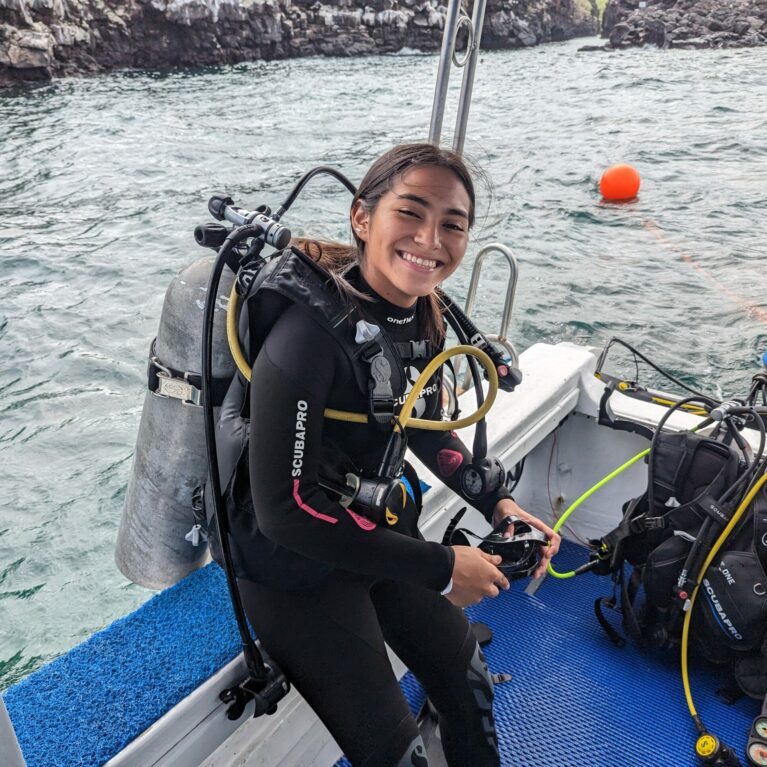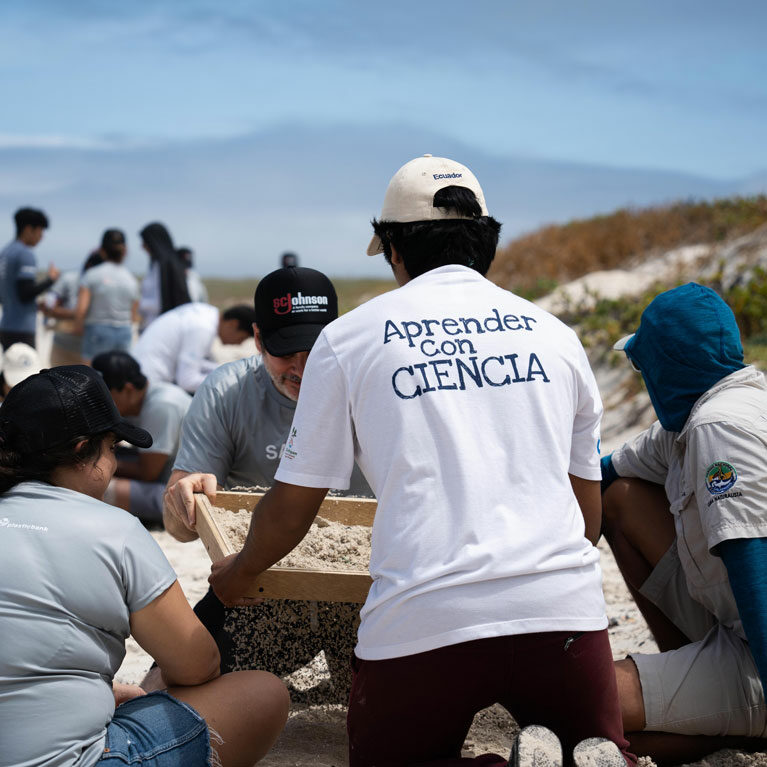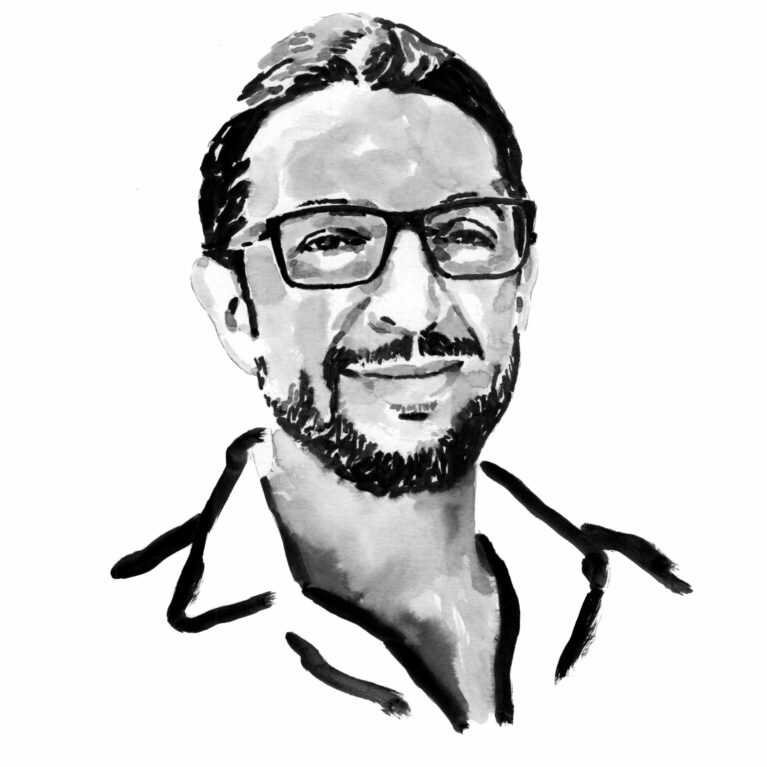Connecting communities to conservation
Juan is on a mission: to get local people into the ocean around the Galápagos Islands and thereby spark a connection that will see them want to protect their environment. As the leader of the Charles Darwin Foundation’s Education Program, Juan runs experiential marine education activities that tie into the islands’ formal and informal education systems. His project funding will help expand his development programmes for learners, helping them to foster a real curiosity about and passion for the ocean.
I am a passionate nature lover who has come to the conclusion that education is the most important way in which people all over the world can better understand the importance of conservation. I first worked as a nature guide in Ecuador’s Amazon rainforest and while exploring different parts of the forest with clients as we searched for wildlife, I noticed the power of ‘experiencing nature’ and how this was connected with knowing and understanding a place that later on you want to see protected. This is when I realised that such a thing as ‘experiential education’ existed and it...


Galapagos Marine Education Program
The Marine Education Project was established in 2016 to teach young galapaguenos from Santa Cruz Island about sharks and marine conservation, and motivate environmentally responsible behavior through science and experiential activities. We are now strengthening these efforts by implementing an institutional Education and Community Outreach Program (ECO-Program) with the mission to create an environmentally literate community in Galapagos, by the incorporation of an integrative and coherent education program that includes science-knowledge-and-practice as a means to achieve attitudinal and behavioral change towards conservation, global awareness on environmental practices and sustainable use of the Galapagos socio-ecosystem. Participants will improve their knowledge of ecosystems, biodiversity, natural resources and threats, increase their environmental sensitivity and develop new skills that will result in behavioral change, making them more proactive towards conservation. One of the ECO-Program’s baselines will continue to be marine conservation with a strong emphasis in sharks, iconic species of the Galapagos Islands.
The Galapagos Islands are a unique place in the world. The islands have earned important recognition as a National Park in Ecuador, a declared Biosphere Reserve by UNESCO, a Whale Sanctuary, a RAMSAR site and currently comprise one of the largest marine reserves in the world with an extension of 138.000 square kilometres holding the greatest shark biomass in the world. The Charles Darwin Foundation (CDF) is the science organization with the longest history of doing research on the islands and is the main one on the islands that manages such wide variety of science projects with renewed local and international scientist and with collaborative support of other science organizations and universities worldwide. This places CDF in a privileged position to exploit our scientific strength for educating the local community making our ECO-Program impactful, complete and unique.
The archipelago is an isolated place with approximately 25,000 inhabitants, based on the last census in 2015. The formal education system on the islands has its own issues, specially the fact that the content taught to students in Galapagos is the same as that used in Ecuador Mainland, and lacks a special focus on the Galapagos reality, with no environmental education contents. Students do not learn about the local ecosystems, biodiversity, conservation challenges and good practices to preserve this unique environment. As a result a considerable percentage of the community do not have a sense of place, making conservation efforts even more challenging. In addition, the local communities here face social problems, with a growing proportion of young people likely to come into contact with drugs or become involved in anti-social behavior. It is vital that people living here are given the opportunity, encouragement and motivation to learn about the pristine place they call home in order to develop proactivity towards conservation, good environmental practices and to adopt sustainable behaviors.
Scientific research is often disseminated and communicated in a way that is difficult for non-experts to understand. CDF‘s ECO-Program communicates marine and land research in a way that encourages the involvement and participation of the Galapagos community. The marine research projects that the Charles Darwin Research Station run are a great baseline to educate the local community in marine science and engage them in conservation. The aim of the ECO-Program is to generate knowledge and sensitivity through experiential education to the community. The ECO-Program aims to empower galapagueno children (8 to 12 years old), teenagers (14 to 17 years old) and adults from all economic, cultural and ethnic backgrounds to connect with nature, increase their sense of responsibility for the islands and positively influence their families and the wider community.
- To involve different groups of the galapagueno community in a marine education program to learn about the importance of marine conservation through science based activities and experiential education.
- To continue running the “Shark Ambassadors – Science Club” and expand it to other islands. This is a Non Formal EducationProject that was originally started in 2017 in Santa Cruz Island and will now be expanded to Isabela island in 2020 and toSan Cristobal Island in 2022.
- To continue the “Marine Mornings” project in Santa Cruz and Isabela and expand it to San Cristobal in 2021 and Floreana in2022. This project, linked to Formal Education, will be re-launched in 2020 as “Natural Mornings” to include land topics and create a more holistic approach to environmental education.
- To continue with the “Sustainable Community” project in Isabela and expand it to Santa Cruz Island in 2020.
- Upgrade the Marine exhibit at the Marine World Center.

